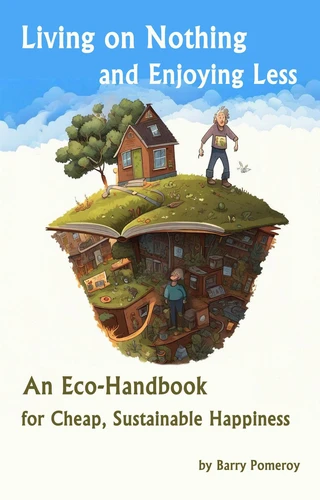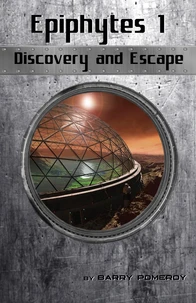Living on Nothing and Enjoying Less: An Eco-Handbook for Cheap, Sustainable Happiness
Par :Formats :
Disponible dans votre compte client Decitre ou Furet du Nord dès validation de votre commande. Le format ePub est :
- Compatible avec une lecture sur My Vivlio (smartphone, tablette, ordinateur)
- Compatible avec une lecture sur liseuses Vivlio
- Pour les liseuses autres que Vivlio, vous devez utiliser le logiciel Adobe Digital Edition. Non compatible avec la lecture sur les liseuses Kindle, Remarkable et Sony
 , qui est-ce ?
, qui est-ce ?Notre partenaire de plateforme de lecture numérique où vous retrouverez l'ensemble de vos ebooks gratuitement
Pour en savoir plus sur nos ebooks, consultez notre aide en ligne ici
- FormatePub
- ISBN978-1-990314-42-1
- EAN9781990314421
- Date de parution25/01/2024
- Protection num.pas de protection
- Infos supplémentairesepub
- ÉditeurBarry Pomeroy
Résumé
The desire to live more frugally, responsibly, and environmentally is loose in the land now. Despite the popularity of a minimalism which had its adherents buying more to pretend they had less, many people have a genuine interest in living more carefully. Learning to reduce our impact runs deeper than saving money or using those savings to buy more consumer goods. Instead, people are starting to question the entire consumer enterprise and to suggest alternatives.
Much of the interest in living more affordably arises from a growing suspicion that consumption will not lead to the ads' promised happiness. The burgeoning interest in bushcraft, maker culture, homemade gifts and household items, living hacks, and dumpster diving shows that the corporate narratives have lost their power. People seeking what might be missing in their lives are using their hands and native ingenuity.
In this study I tell the oft-requested story of how I avoid spending, list the tips and tricks I have learned, discuss both the environmental and social implications of uncontrolled spending, and offer some insight about how happiness can be achieved without breaking the bank. This is meant for those who want to live on less, as well as those who still need to negotiate a society which would have us spend the precious coin that is our lives working for the corporate benefit instead of our own.
Much of the interest in living more affordably arises from a growing suspicion that consumption will not lead to the ads' promised happiness. The burgeoning interest in bushcraft, maker culture, homemade gifts and household items, living hacks, and dumpster diving shows that the corporate narratives have lost their power. People seeking what might be missing in their lives are using their hands and native ingenuity.
In this study I tell the oft-requested story of how I avoid spending, list the tips and tricks I have learned, discuss both the environmental and social implications of uncontrolled spending, and offer some insight about how happiness can be achieved without breaking the bank. This is meant for those who want to live on less, as well as those who still need to negotiate a society which would have us spend the precious coin that is our lives working for the corporate benefit instead of our own.
The desire to live more frugally, responsibly, and environmentally is loose in the land now. Despite the popularity of a minimalism which had its adherents buying more to pretend they had less, many people have a genuine interest in living more carefully. Learning to reduce our impact runs deeper than saving money or using those savings to buy more consumer goods. Instead, people are starting to question the entire consumer enterprise and to suggest alternatives.
Much of the interest in living more affordably arises from a growing suspicion that consumption will not lead to the ads' promised happiness. The burgeoning interest in bushcraft, maker culture, homemade gifts and household items, living hacks, and dumpster diving shows that the corporate narratives have lost their power. People seeking what might be missing in their lives are using their hands and native ingenuity.
In this study I tell the oft-requested story of how I avoid spending, list the tips and tricks I have learned, discuss both the environmental and social implications of uncontrolled spending, and offer some insight about how happiness can be achieved without breaking the bank. This is meant for those who want to live on less, as well as those who still need to negotiate a society which would have us spend the precious coin that is our lives working for the corporate benefit instead of our own.
Much of the interest in living more affordably arises from a growing suspicion that consumption will not lead to the ads' promised happiness. The burgeoning interest in bushcraft, maker culture, homemade gifts and household items, living hacks, and dumpster diving shows that the corporate narratives have lost their power. People seeking what might be missing in their lives are using their hands and native ingenuity.
In this study I tell the oft-requested story of how I avoid spending, list the tips and tricks I have learned, discuss both the environmental and social implications of uncontrolled spending, and offer some insight about how happiness can be achieved without breaking the bank. This is meant for those who want to live on less, as well as those who still need to negotiate a society which would have us spend the precious coin that is our lives working for the corporate benefit instead of our own.






















